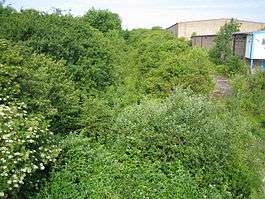Chaul End railway station
Chaul End was a temporary railway halt on the Great Northern Railway's branch line from Welwyn which served a munitions factory near Luton during the First World War. The station site has been reused as part of the Luton to Dunstable Busway.
| Chaul End | |
|---|---|
 Near the station site in 2006. | |
| Location | |
| Place | Chaul End |
| Area | Luton |
| Grid reference | TL063222 |
| Operations | |
| Original company | Great Northern Railway |
| Platforms | 1 |
| History | |
| 1914/1915 | Opened |
| 1919/1920 | Closed |
| Disused railway stations in the United Kingdom | |
| Closed railway stations in Britain A B C D–F G H–J K–L M–O P–R S T–V W–Z | |
History
On 12 June 1861, the Great Northern Railway acquired the Hertford, Luton and Dunstable Railway's line from Dunstable Church Street station to Luton Bute Street station,[1][2] which had opened to goods traffic on 5 April 1858 and to passengers on 3 May.[3][4][5][6][7][8][9]
From Luton Bute Street station, the line headed westwards through Luton passing Kenilworth Road stadium and Laporte's chemical works before reaching a level crossing at Chaul End.[10] A small timber 10-lever signal box was located here on the Up side of the line with a gatekeeper's house standing opposite.[11][12] The crossing was protected by a home and distant signal in each direction; the distant being an upper quadrant signal while the home was a somersault signal.[13]
As part of the First World War war effort, a factory at Chaul End was taken over for the manufacture of shells.[13] A temporary halt to serve the factory was opened in 1914[14][15][16] or 1915[17][18][19] The station is believed to have been situated to the east of the level crossing.[20] Munitions workers using the station could be easily recognised by the orange-yellow dust from the powder with which shells were filled.[17][18] London and North Western Railway trains also called at the station from 28 February 1916;[17][18] tickets to the station showed it as "Luton (Chaul End)".[14] The factory itself was served by a siding capable of accommodating five wagons, which was taken out of use on 20 April 1916.[17][18]
The station closed in either 1919[14][15][16] or 1920,[17][18] and was demolished soon afterwards.[18]
| Preceding station | Disused railways | Following station | ||
|---|---|---|---|---|
| Dunstable Town | Great Northern Railway Dunstable Branch Line |
Luton Bute Street |
Present day
The signal box at Chaul End remained in use until 1 November 1969,[12] following which it was boarded up and the gatekeeper's house opposite demolished.[21] The level crossing remained in use until the 1980s when it was replaced by a bridge carrying the road over the line.[20]
The line remained open until oil traffic on the line ceased on 30 April 1989 when it was mothballed and then officially closed on 28 March 1991.[22]
The Luton to Dunstable Busway passes through the site.[20]
References
Notes
- Awdry 1990, p. 146.
- Simpson 1998, p. 14.
- Awdry 1990, pp. 145–146.
- Davies & Grant 1984, p. 64.
- Oppitz 2000, p. 110.
- Simpson 1998, p. 12.
- Leleux 1984, p. 30.
- Cockman 1974, p. 32.
- Woodward & Woodward 1994, p. 14.
- Woodward & Woodward 1994, p. 53.
- Woodward & Woodward 1994, pp. 53, 61.
- Woodward & Woodward 2008, fig. 49.
- Woodward & Woodward 1994, p. 61.
- Croughton, Kidner & Young 1982, p. 58.
- Quick 2009, p. 121.
- Butt 1995, p. 58.
- Woodward & Woodward 1994, p. 99.
- Woodward & Woodward 2008, fig. 48.
- Davies & Grant 1984, p. 67.
- "Disused Stations". Subterranea Britannica.
- Woodward & Woodward 1994, p. 130.
- Shannon 1996, p. 90.
Sources
- Awdry, Christopher (1990). Encyclopaedia of British Railway Companies. Sparkford: Patrick Stephens Ltd. ISBN 1-8526-0049-7. OCLC 19514063. CN 8983.
- Butt, R. V. J. (1995). The Directory of Railway Stations: details every public and private passenger station, halt, platform and stopping place, past and present (1st ed.). Sparkford: Patrick Stephens Ltd. ISBN 978-1-85260-508-7. OCLC 60251199.
- Cockman, F.G. (1974). The Railway Age in Bedfordshire. Bedford: Bedfordshire Historical Record Society. ISBN 0-85155-035-5.CS1 maint: ref=harv (link)
- Croughton, Godfrey; Kidner, R.W.; Young, Alan (1982). Private and Untimetabled Railway Stations. Salisbury: Oakwood Press. ISBN 0-85361-281-1.CS1 maint: ref=harv (link)
- Davies, R.; Grant, M.D. (1984) [1975]. Forgotten Railways: Chilterns and Cotswolds. Newton Abbot, Devon: David St John Thomas. ISBN 0-946537-07-0.CS1 maint: ref=harv (link)
- Leleux, Robin (1984) [1976]. A Regional History of the Railways of Great Britain: The East Midlands (Volume 9). Newton Abbot, Devon: David St. John Thomas. ISBN 978-0-946537-06-8.CS1 maint: ref=harv (link)
- Quick, Michael (2009) [2001]. Railway passenger stations in Great Britain: a chronology (4th ed.). Oxford: Railway and Canal Historical Society. ISBN 978-0-901461-57-5. OCLC 612226077.
- Shannon, Paul (1996) [1995]. British Railways Past and Present: Buckinghamshire, Bedfordshire and West Hertfordshire. Wadenhoe, Peterborough: Past & Present Publishing. ISBN 978-1-85895-073-0. No. 24.CS1 maint: ref=harv (link)
- Simpson, Bill (1998). The Dunstable Branch. Witney, Oxon: Lamplight Publications. ISBN 978-1-899246-03-8.CS1 maint: ref=harv (link)
- Woodward, Sue; Woodward, Geoff (May 2008). Branch Line to Dunstable from Leighton Buzzard to Hatfield. Midhurst, West Sussex: Middleton Press. ISBN 978-1-906008-27-7.CS1 maint: ref=harv (link)
- Woodward, Sue; Woodward, Geoff (1994). The Hatfield, Luton and Dunstable Railway. Headington, Oxford: The Oakwood Press. ISBN 978-0-85361-458-6. LP44.CS1 maint: ref=harv (link)